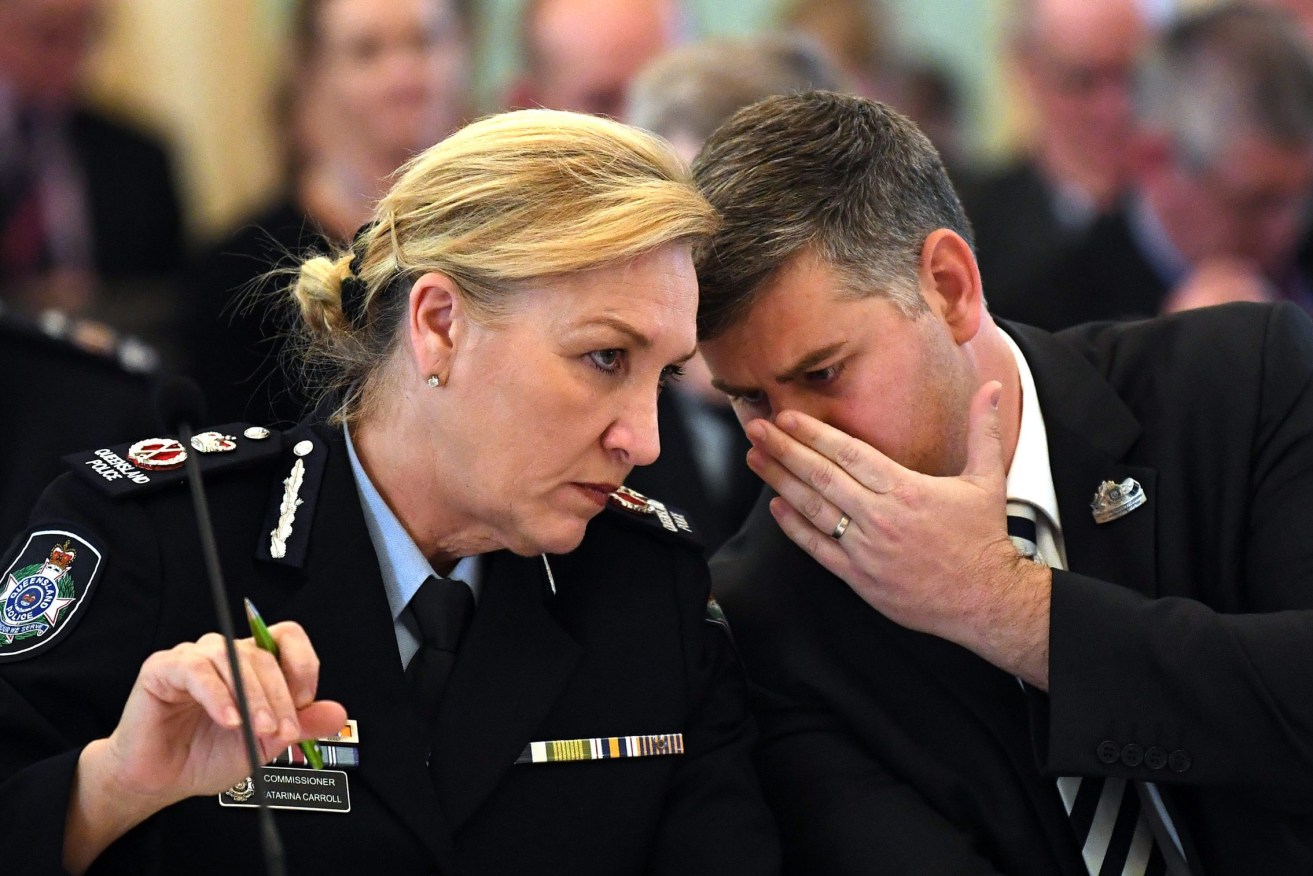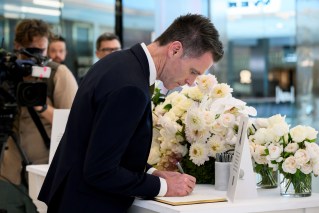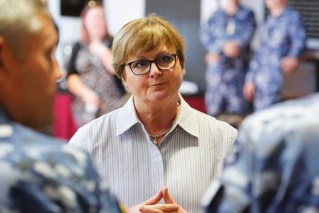Watch house scandal exposes deep divisions over how to curb youth crime
Queensland Family and Child Commission boss Luke Twyford has slammed views from Police Commissioner Katarina Carroll and backed by Police Minister Mark Ryan that watch house detention for some young offenders might be “the only way” to stop their criminal behaviour.


Queensland Police Minister Mark Ryan (right) and Commissioner Katarina Carroll. Ryan will support the renewal of her contract. (Photo: AAP Image/Dan Peled) .
Twyford was responding to Carroll’s comments expressed on ABC Brisbane Radio that watch house detention was a “temporary solution” to the state’s rising youth crime wave, particularly in managing hardened, recidivist offenders..
He said a watch house was not an appropriate place to house a child, regardless of the circumstances that led them to offend, and they should not be used as an accommodation placement option.
“The evidence shows that watch houses are harmful and re-traumatising to children,” Twyford told InQueensland.
“We have no evidence that shows the use of watch houses prevents reoffending. The use of watch houses for children disproportionately affects Aboriginal and Torres Strait Islander children, who are 27 times more likely to be held in custody and less likely to be diverted from the system on any given day.”
Queensland’s top law enforcement officer told ABC Radio that 2022 had seen 100 more children held in watch houses compared to the previous 12 months.
As of Wednesday, February 8, she said, 88 children were being held in watch houses across the state, citing the practice as “the only way” to stop them re-offending. Most of the children in custody were between 15 and 17, she said, also explaining they were being detained for “extraordinarily serious offences”.
The comments come after InQueensland revealed the shocking treatment of an Indigenous Mount Isa teenager in detention over Christmas, who was locked in a cell for up to 23 hours a day with minimal visits and only a television for company.
Carroll’s defence of the hardline approach also comes less than a week after another senior police officer, acting deputy commissioner George Marchesini and the head of a new Queensland police taskforce into youth crime, told media that keeping children in detention was not the “end solution”.
The seemingly divided approach among the top brass of Queensland Police towards managing the state’s worsening youth crime crisis has left Police Minister Mark Ryan to re-assert his government’s intention to get tougher on crime on the basis of delivering on community expectations.
“The community has spoken loud and clear – they want to be safe and we’re all on the same page,” he told a media conference today.
“We have a particularly small cohort of offenders at the moment who are causing great harm in the community. We have strong laws and great support for our police with additional resourcing and personnel.
“But we know there is always an opportunity to do more.”
The escalating rhetoric and the data showing that Queensland is detaining more children in watch houses for longer, has Twyford and his team on alert.
He said the trend was “exceptionally concerning” and that media reports of children being denied their basic rights while in watch houses were unacceptable.
“The Queensland Family and Child Commission is monitoring the use of watch houses as part of our youth justice monitoring work and is committed to working with government and communities on solutions,” he said.
“When a young person offends, they need to be taken to a safe facility where they are provided with ongoing intensive, rehabilitative support that addresses the causes of the offending. A watch house does not offer this support.
“Each young person engages in crime for a different reason, and they each need a tailored response that addresses their specific needs—no one response will work for everyone who offends, especially for serious offenders.”
With just weeks until the first sitting of parliament for 2023, when the Palaszczuk Government’s record on youth justice is expected to be one of the prominent attack targets for the Opposition, Ryan said he would not back away from his government’s commitment to introduce tighter laws, increase penalties and deliver more resources for police to tackle youth crime.
He said he would also not apologise for youth offenders being kept in watch houses.
“We make no apologies for people who have been lawfully directed to be detained – these are decisions made by the police and the courts,” he said.
“In the interests of safety, and safety always comes first, if someone has to be detained in a watch house for a period of time, that is for their safety and the safety of the community.
“The priority is community safety; these are offenders who have committed harm against the community.”
Griffith University Professor William Wood said today’s comments from the commissioner and minister were a classic example of “policymaker posturing”, where politics has taken priority over the needs of young people.
“It is shameful that we are locking up young people at all in watch houses, let along under conditions of solitary confinement,” he said.
“What is happening to these young people is a human rights violation. It will do nothing to change their behaviours. It will not keep the community safer in the long run. And it will just pass the problem to the next administration, who will in turn look for another silver bullet solution that inevitably continues this cycle.”
Wood said that from his years of experience, children were rarely in watch houses because law enforcement and the judicial system were at a loss of what to do, or had no other options to detain young offenders safely.
“They are in watch houses because politicians decided to put them in watch houses,” he said.
“Even the government’s own experts are telling them this is a mistake. This cycle will not end without significant investment in community infrastructure that prevents crime before it begins, and targeted support for effective community-based programs that address the multi-systemic needs of serious youth offenders.
“These things work, but they need time, and successive Queensland administrations have had a poor sustained follow-though of proven and effective youth crime policies.”












